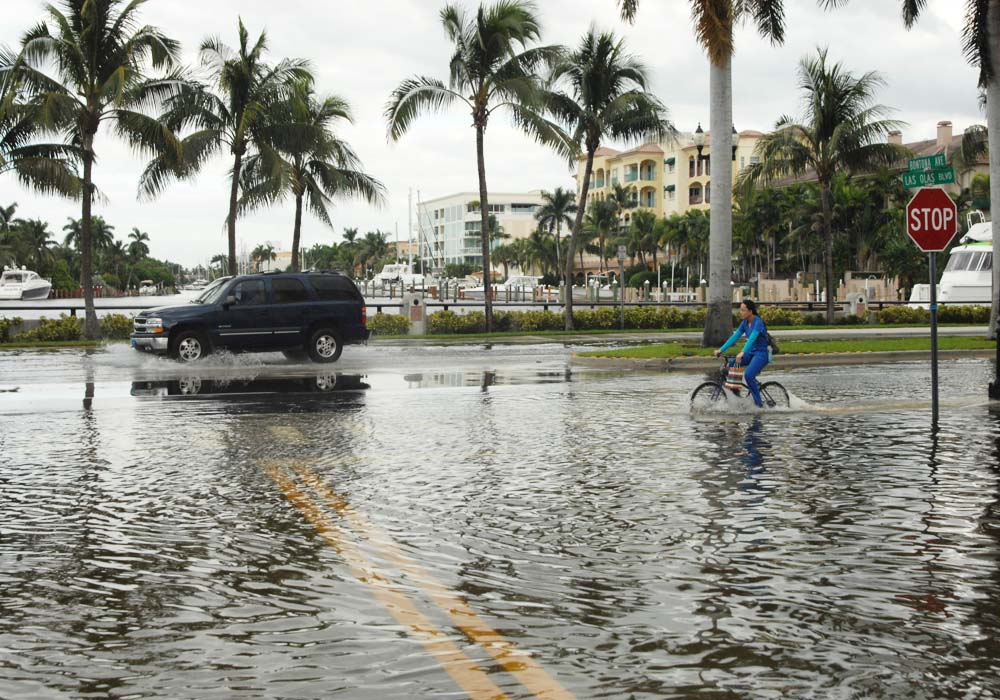Following forecasts for an above-normal hurricane season in the Atlantic Ocean, scientists from the University of California, Santa Cruz, and The Nature Conservancy published a study that proposes prioritizing property buyouts based on flood risk, ecological value, and socioeconomic conditions.
The study can be downloaded HERE from the Journal of Ocean and Coastal Economics (JOCE).

Repetitive loss properties in Florida
Flooding is the most common and damaging of all natural disasters in the United States. According to the Federal Emergency Management Agency (FEMA), 44 of the 46 major disaster declarations in 2016 were related to storms, with flooding being a significant factor in almost 70% of them (30 events) (2). In 2016, severe floods in the U.S resulted in more than $17 billion in damages (six times higher than in 2015). Twelve individual weather and climate events caused more than $1 billion in damages each (3), and at least five severe 1000-yr precipitation events occurred in the U.S. in 2016 (4).
The study also shows the location of more than 15,000 repetitive loss properties in Florida, which, collectively, filed more than 40,000 claims against the National Flood Insurance Program (NFIP), between 1978 and 2011 – more than 1,200 claims per year, on average. As of March of 2016, the National Flood Insurance Program, which is up for reauthorization in 2017, owed the U.S. Treasury $23 Billion.

Repetitive loss properties with high social vulnerability and high ecological value.
According to lead author, Dr. Juliano Calil: “This study identified properties and surrounding land in Florida where buyouts can reduce future flood risk to socially vulnerable communities, and simultaneously promote the restoration of the floodplain to a more natural condition. We identified almost 150 properties in Miami-Dade County alone that are located in areas where these objectives are very well aligned.”
Coauthor Sarah Newkirk, Senior Coastal Project Director with The Nature Conservancy in California, adds: “Our approach identifies an opportunity to use funding previously designated only for flood mitigation to achieve additional benefits – including valuable social and ecological outcomes.”
References:
1. Above-normal Atlantic hurricane season is most likely this year | National Oceanic and
Atmospheric Administration Available at: http://www.noaa.gov/media-release/abovenormal-atlantic-hurricane-season-is-most-likely-year
[Accessed August 8, 2017].
2. FEMA (2017) Disaster Declarations for 2016. 1. Available at:
https://www.fema.gov/disasters/grid/year/2015?field_disaster_type_term_tid_1=All
[Accessed January 19, 2017].
3. NOAA, Smith AB 2016: A historic year for billion-dollar weather and climate disasters
in U.S. Available at: https://www.climate.gov/news-features/blogs/beyond-data/2016-
historic-year-billion-dollar-weather-and-climate-disasters-us [Accessed February 12,
2017].
4. NOAA (2016) NOAA National Center for Environmental Information. Available at:
https://search.usa.gov/search?utf8=✓&affiliate=ncdc&query=thousand+year+storm
[Accessed June 12, 2017].
Contact Information:
Juliano Calil, Ph.D., MESM, BBA
Senior Research Fellow, Center for the Blue Economy
Adjunct Professor, Middlebury Institute of International Studies at Monterey Contact: juliano dot calil at gmail dot com
Sarah Newkirk, J.D, MS, BA Senior Coastal Project Director The Nature Conservancy Contact: snewkirk at tnc dot org
Laura Geselbracht Senior Marine Scientist The Nature Conservancy Contact: lgeselbracht at tnc dot org

